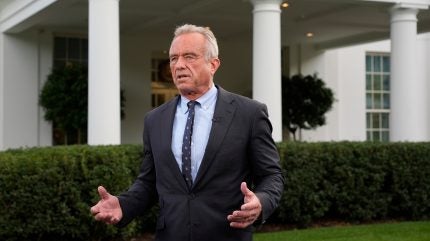
The Trump administration has issued a report tracing out policy changes to improve the health of US children but the document has attracted criticism.
Robert F. Kennedy Jr., the US Health and Human Services Secretary, introduced the Make Our Children Healthy Again Strategy yesterday (9 September), a report outlining more than 120 initiatives with few details.

Discover B2B Marketing That Performs
Combine business intelligence and editorial excellence to reach engaged professionals across 36 leading media platforms.
The plans address areas such as food labelling, nutrition and ingredients used in products.
However, the report was light on how the administration would convert policy goals into concrete regulations.
According to the report, there are four main contributors to chronic disease levels in US children: a poor diet; exposure to “chemicals”; lack of physical activity and chronic stress: and “overmedicalisation”.
One tangible move from the Make America Healthy Again Commission is to re-introduce whole milk into the country’s dietary guidelines.

US Tariffs are shifting - will you react or anticipate?
Don’t let policy changes catch you off guard. Stay proactive with real-time data and expert analysis.
By GlobalDataWhile the report faulted relaxed food regulations for leading to poorer health results, it also pushed for deregulation in other areas, including the removal of “mandatory reduced-fat requirements” in federal nutrition schemes.
The report unsurprisingly echoed Kennedy’s regular condemnation of “ultra-processed foods” and synthetic food colours.
According to the report, the administration will “continue efforts” to develop a unified federal definition for ultra-processed food.
The US government will also “consider revisions” to its proposals on front-of-pack nutrition labels based on the feedback it had received.
“This strategy represents the most sweeping reform agenda in modern history – realigning our food and health systems, driving education, and unleashing science to protect America’s children and families,” Kennedy Jr. said.
Nevertheless, campaigners highlighted the lack of specifics in the report, with the administration also criticised for not being strong enough on industry.
“The final MAHA report issued today will bring a collective sigh of relief in food industry boardrooms, since it leans heavily in the direction of government deregulation, voluntary corporate action and research likely to be decimated under the President’s proposed budget,” Dr Peter Lurie, the president of the Center for Science in the Public Interest, said. “The report ignores the actual causes of chronic diseases and proven interventions, and the administration’s actions are otherwise making Americans hungrier, sicker and less safe.”
Kari Hamerschlag, the deputy director of the food and agriculture programme at Friends of the Earth, argued the report “has the agrochemical industry’s fingerprints all over it”.
She added: “This report is not a roadmap for improving children’s health – it’s a green light for increased agribusiness profits at the expense of our communities, environment and children’s well-being.”
Non-profit Environmental Working Group also took aim at the administration, claiming the MAHA plan “echoes the pesticide industry’s talking points”, containing “zero” references to prohibiting harmful pesticides.
“It looks like pesticide industry lobbyists steamrolled the MAHA Commission’s agenda,” EWG co-founder and president Ken Cook said.
The report said the US government would “prioritise research to help growers adopt precision agricultural techniques” but avoided calling for tougher controls on pesticides.
The American Farm Bureau Federation gave the report a positive response. “A renewed focus on American-grown fresh fruits, vegetables and meat, along with reintroducing whole milk into the school meal programmes can help provide a foundation for a lifetime of smart choices. Reducing or streamlining regulations in smart ways can allow farms operating on very thin margins to innovate, diversify and respond to consumer demand,” president Zippy Duvall said.
“Prioritising voluntary conservation efforts for farmers and ranchers and optimising EPA’s already robust pesticide regulatory process to accelerate innovation are welcome recommendations.”
Devin Mogler, the president and CEO of the National Oilseed Processors Association, labelled the report a “step in the right direction” and said the document was “consistent with the broad scientific consensus that our food system remains safe and secure”.
Kennedy has been an outspoken critic of the bigger food manufacturers operating in the US, taking aim at their marketing of “ultra-processed foods” and the make-up of their product recipes.
In April, the FDA unveiled measures to phase out the use of petroleum-based food dyes by the end of next year, although the move was questioned in some quarters for not including binding regulations. Nonetheless, several US food companies have moved to remove the ingredients.
Consumer Brands Association, the principal US industry association including many of the largest food and drinks companies in the US, issued a measured response to the MAHA report.
“Consumer Brands Association would characterise the MAHA Commission report as a very ambitious agenda with a lot to get done in a short period of time,” president and CEO Melissa Hockstead said.
“Consumer Brands will work with the Trump administration as they implement these policy recommendations to address childhood chronic diseases and ensure families have continued access to safe, nutritious, affordable and convenient product choices.
“To sustain the Make America Healthy Again legacy and allow companies to innovate to provide healthier choices, we urge the administration to support federal uniformity as it relates to ingredient safety and transparency.”



